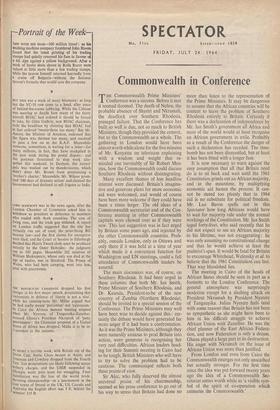Commonwealth in Conference
THE Commonwealth Prime Ministers' Conference was a success. Before it met it seemed doomed. The death of Nehru, the probable absence of Shastri and Nkrumah, the deadlock over Southern Rhodesia, presaged failure. That the Conference has built so well is due, not so much to British Ministers, though they provided the cement, but to the Commonwealth as a whole. The gathering in London would have been almost worth while alone for the five minutes of Mr. Kenyatta on television explaining with a wisdom and weight that re- minded one inevitably of Sir Robert Men- zies, how the Commonwealth could discuss Southern Rhodesia without disintegrating.
Many excellent themes of less headline interest were discussed. Britain's imagina- tive and generous plans for more economic aid were welcomed, and would of course have been more welcome if they could have been x times larger. The old ideas of a Commonwealth secretariat and of the Con- ference meeting in other Commonwealth capitals were chewed over as if they were new. This last suggestion was in fact urged by Britain some years ago, and rejected by the other Commonwealth countries. Prob- ably, outside London, only in Ottawa and only there if it was held at a time of year which made it a convenient function for Washington and UN meetings, could a full attendance of Commonwealth leaders be assured.
The main discussion was, of course, on Southern Rhodesia. It had been urged in' these columns that both Mr. Ian Smith, Prime Minister of Southern Rhodesia, and Dr. Kaunda, President-to-be of the new country of Zambia (Northern Rhodesia), should be invited to a special session of the Conference. The Prime Ministers may well have been wise to decide against this : cer- tainly the debate would have generated far more anger if it had been a confrontation. As it was the Prime Ministers, although they were naturally anxious to prod Britain into action, were generous in recognising her very real difficulties. African leaders head- ing for their Summit meeting in Cairo had to be tough; British Ministers who will have to try to solve the problem had to be cautious. The communiqué reflects both these points of view. Sir Alec, who fully deserved the almost universal praise of his chairmanship, seemed at his press conference to go out of his way to stress that Britain had done no more than listen to the representation of the Prime Ministers. It may be dangerous to assume that the African countries will be content to leave the problem of Southern Rhodesia entirely to Britain. Certainly if there was a declaration of independence by Mr. Ian Smith's government all Africa and most of the world would at least recognise an African government in exile. Probably as a result of the Conference the danger of such a declaration has receded. The time- bomb has not been dismantled, but at least it has been fitted with a longer fuse.
It is now necessary to warn against the easy assumption that all that Britain need do is to sit back and wait until the 1961 Constitution grinds out an African majority, and in the meantime, by multiplying economic aid hasten the process. It can- not be stated too plainly that in 1964 aid is no substitute for political freedom. Mr. Leo Baron spells out in this Spectator how long Africans would have to wait for majority rule under the normal workings of the Constitution. Mr. Ian Smith (aged forty-five), who said recently that he did not expect to see an African, majority in his lifetime, was not exaggerating : he was only assuming no constitutional change and that he would achieve at least the psalmist's span. It would be fatal for Britain to encourage Whitehead, Welensky et al. to believe that the 1961 Constitution can last. That way bloodshed lies.
The meeting in Cairo of the heads of African States should be seen in part as a footnote to the London Conference. The general atmosphere was surprisingly moderate except for a slashing attack on President Nkrumah by President Nyerere of Tanganyika. Julius Nyerere feels (and with some reason) that Britain has not been as sympathetic as she might have been to him in his difficult struggle to achieve African Union with Zanzibar. He was the chief planner of the East African Federa- tion, and now Federation is only a dream. Ghana played a large part in its destruction. His anger with Nkrumah on the issue of African Union was more than justified.
From London and even from Cairo the Commonwealth emerges not only unscathed but actually stronger. For the first time since the idea was put forward twenty years ago the idea of a Commonwealth Sec- retariat seems worth while as 'a visible sym- bol of the spirit of co-operation whiCh animates the Commonwealth.'














































 Previous page
Previous page